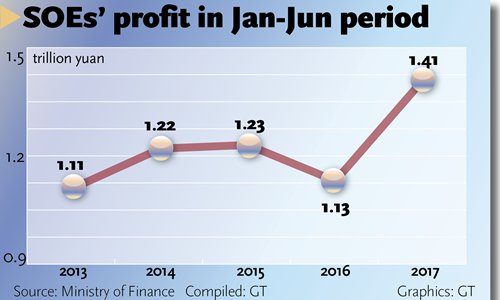
(Graphics/GT)
Changes slated to happen before end of the year
Many centrally administered State-owned enterprises (SOEs) will be converted into limited liability firms or joint-stock firms by the end of 2017, according to a State Council document released Wednesday.
Experts said the step is a fundamental one toward a modern corporate system and in the future many companies will elect their management according to the modern enterprise system.
The reform targets SOEs supervised by the State-owned Assets Supervision and Administration Commission (SASAC), according to an action plan released by the State Council, China's cabinet. Financial and cultural SOEs are not affected.
In particular, the action plan called for all central SOEs registered according to the country's 1988 Law on Industrial Enterprises Owned by the Whole People to be registered according to the Company Law by the end of the year. The restructuring aims to help the firms set up flexible and market-based operating mechanisms.
Experts said this is a move that should have been finished a decade ago.
Wang Jiang, director of the Beijing-based Central SOEs Think-tank Alliance, said that currently only about one-third of the central SOEs have completed the process of converting to limited liability or joint stock firms.
"This blurred the boundaries of State capital, and caused the group company to be out of sync with its subsidiaries, many of which have already been restructured. So such a move greatly helps the group level SOEs to further consolidate their resources," Wang told the Global Times on Wednesday.
After years of reform, more than 90 percent of China's SOEs have been restructured to follow the modern corporate system, said the State Council.
Feng Liguo, an expert at the Beijing-based China Enterprise Confederation, said that under the 1988 law, a general manager is the top management at a SOE while under the Company Law, a chairman of the board is the top management.
"The restructuring is of a fundamental nature, and is an important step for further market-oriented reforms. The reform process bids farewell to the old planned-economy system and is a step toward the modern corporate system," Feng told the Global Times on Wednesday.
It will also help pave the way to clear zombie companies - chronically loss-making companies - making it easier to liquidate the assets owned by the zombie firms, Feng said.
According to the action plan, group-level central SOEs that have yet to restructure will become either wholly State-funded enterprises, or enterprises with diverse equity structures.
Central SOEs will be granted support during the reform period, including help with management of allotted land, tax benefits, registration of changes, and the changeover of business license qualifications.
"From the perspective of State-assets supervision, group companies will have limited liabilities in the future, compared to unlimited liability beforehand. This will allow them to focus on their role of managing capital," Wang said, noting that the new system will pave the way for separating governmental from business operations.
Company management
"The corporate reform of group companies will in turn pave the way for ownership diversification including mixed ownership. These reform processes are prerequisite to the professional manager mechanism and market-oriented incentive mechanism," Wang noted.
Wang said whether the practice of appointing SOE executives will end has to be judged from a long-term perspective.
"When the company is fully market-oriented, and the professional manager mechanism has become mature and regulated, we can stop the appointment practice," Wang said. "Before that, the appointment practice will still last for some time as it is still an effective way to exercise control over State capital for the moment."
Feng noted that many of the companies that withdrew from front stage after previous mergers also need to undergo the process.
"This work is long-due, but the clearing process is complex and it will take time. Some SOEs that have yet to be restructured according to the modern corporate system have a large volume of assets and big payrolls," Feng said.


















































